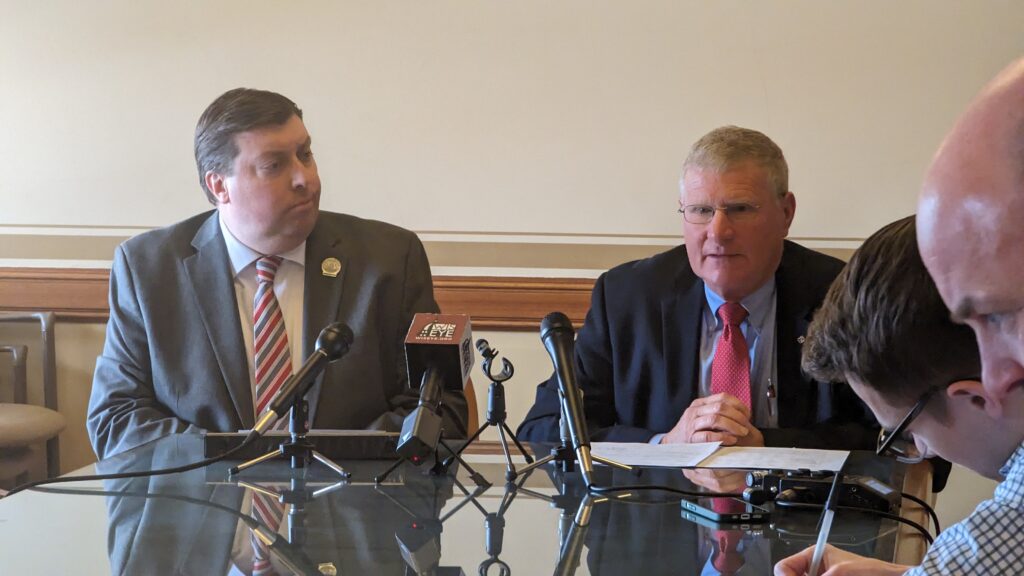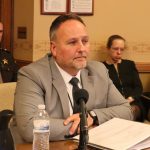DSPS Secretary, Republicans Debate Licensing Staffing, Backlog
Secretary-designee wants to use its revenue to hire staff, Republicans question backlog, push for fewer licenses.

JFC co-chairs Rep. Mark Born (R-Beaver Dam) and Sen. Howard Marklein (R-Spring Green) speaking to reporters prior to the Thursday hearing. Photo by Baylor Spears/Wisconsin Examiner.
Republicans on Wisconsin’s powerful budget-writing committee expressed doubt about a state agency’s handling of an ongoing professional licensing backlog and proposed budget solutions at a Thursday hearing.
Department of Safety and Professional Services (DSPS) Secretary-designee Dan Hereth defended the agency’s budget staffing requests, saying they would be essential for upkeep of recent improvements in the agency.
Hereth remarked early in his testimony on Thursday that the investments the agency is seeking will require no tax revenue. DSPS, which is responsible for issuing professional licenses, is funded almost entirely through fees it collects. The agency currently has a budget surplus of $47 million, but it needs approval from the Legislature to put that money to use.
“We currently have enough to fund this budget request,” Hereth said. “Rather than allowing this funding to sit in government coffers, we are asking these readily available resources be put to work.”
Hereth said investment in the department’s capacity — to answer calls and work with residents on their license applications and issue approvals — is essential if Wisconsin wants to support its workers and keep up with other states.
“Our department must adapt, modernize and increase capacity if we are to compete for and satisfy the workforce we desperately need to recruit and retain if we are to ensure Wisconsin’s future success,” Hereth told the committee.
DSPS has been scrutinized in recent years due to significant delays in the processing and approval of professional licenses with many residents waiting months before receiving approval. Troubles with the agency’s response times started before Gov. Tony Evers took office.
Hereth said the proposals in Evers’ executive budget will help the department address the ongoing backlog of professional license applications and better meet the needs of workers. Under Evers’ proposal, the agency would get almost 80 new employees, including 14 full-time employees to meet demand in the agency’s customer service center and 16 full-time employees to provide efficient and effective processing of license applications.
Hereth described recent improvements in the department’s functions, emphasizing that they could quickly fall away without the more systemic fix of additional permanent staff.
He told the committee that the average license processing time has fallen from 45 days to 38 days and it will expand its service window to be open full time starting next week as opposed to the current hours of 7:30 a.m. to 12:30 p.m.
A year ago, Hereth said, the agency’s answer rate for its service line was around 37%. Today, it’s around 97%, partially because the agency was able to hire 22 contractors using federal emergency funds. However, Hereth said the funding will soon end, and replacing those contractors with 14 additional full-time employees could be essential for maintaining that improved answer rate.
“Permanent staff build knowledge and offer greater value,” Hereth told the committee. “They are more effective and efficient and less costly than contract staff.” He said if the department requests aren’t approved and the federally funded positions expire, the department risks returning to two-hour hold times.
Hereth said the agency is also now responding to new material it receives in under two weeks, compared with old response times of four to six weeks. He said his goal is to get that response time to under a week.
Republican lawmakers asked why the agency did not come to the budget committee earlier to make its requests outside of the budget cycle.
“When we don’t hear about an agency, we know things are going fine and when it’s not going fine, we hear a lot about it. Certainly heard a lot about your agency in the last couple of years,” Rep. Mark Born (R-Beaver Dam), who chairs the committee, said. “If there’s a case to be made for staffing, why haven’t you brought that forward?”
Hereth, who started in the position in August 2022, said a request was started at one point, but there was a prevailing understanding that staffing was not on the table with the committee. When he took the position, he said his focus was on establishing productivity and moving forward with the assets that were available, which were the contractors.
Sen. LaTonya Johnson (D-Milwaukee) pushed back on assertions that the agency never asked the Legislature for approval to spend additional funds, pointing out that the JFC didn’t fulfill the agency’s full requests in the last two budget cycles.
“The reason that people are having problems with DSPS has absolutely nothing to do with the leadership…, but [it’s to do] with us as a body not funding your requests,” Johnson said. “If we had approved those positions or a lot of the money that you’re already currently bringing in your department, then we wouldn’t have this backlog of licenses.”
Sen. Joan Ballweg (R-Markesan) suggested that there may just be too many occupations that require licenses.
“Maybe we just have too many licenses,” Ballweg said. “Maybe we should be taking a look at getting rid of some of the things that you have to do so that you would have enough workers there to take care of the things that are really important.”
The Joint Finance Committee (JFC) will spend the next several months debating and rewriting Evers’ proposed budget. The Republican leaders on the committee have said they plan to start from scratch. Once the JFC is finished with its work, the Legislature will vote on the spending plan and send it to Evers to be signed. The budget deadline is July 1.
DSPS Secretary defends budget requests at committee hearing was originally published by the Wisconsin Examiner.





















Two points: Part of the Republican playbook is to underfund a program like this one and then complain then complain that the program is not doing what it is suppose to. Senator Ballweg’s comment about licensing is ludicrous. Without licensing, a person can declare that they are a plumber, architect, psychotherapist or any other licensed person and there would be no protection for the consumer. This is an another example of Republican Luddite thinking.
The only time a politician promotes the easing of regulations is when it will benefit him/her financially or politically.
Mark Born and Joan Ballweg with their limp “what abouts.” They are not interested in finding credible solutions or modernizing state institutions.